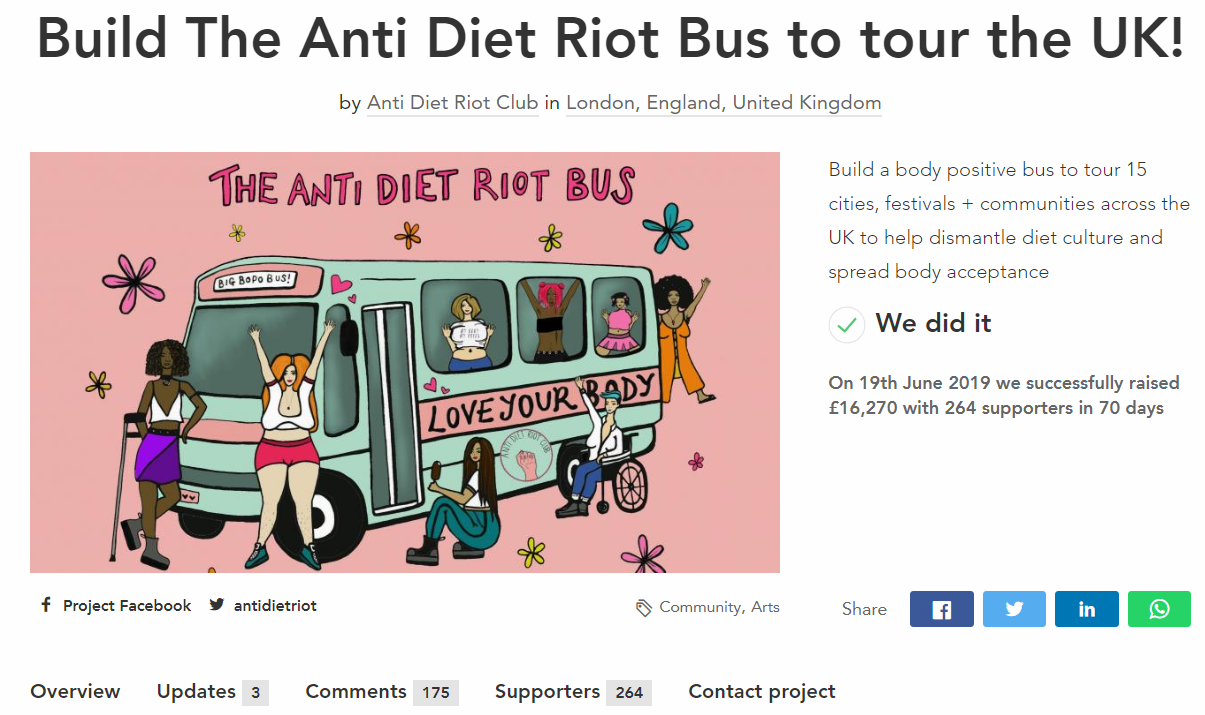How crowdfunding gives women an edge in business
Men still attract the bulk of startup financing – yet when it comes to crowdfunding, women-led campaigns seem to do better than those of their male counterparts. Why is this, and what can founders learn from successful campaigns of the past? Top tips from a crowdfunding expert.
Funding for female entrepreneurs has gone from being brushed under the carpet to a pretty hot topic in recent years. That’s partly because the gender imbalance in startups has become so clear. For every 10 male UK entrepreneurs, there are fewer than five female ones (although social enteprises do much better on this front); women start businesses with 53% less capital on average than men. Worldwide, only 2% of venture capital went to female founders in 2018.
Along with that awareness has come a rise in popularity of crowdfunding.
Crowdfunding is the process of funding a project from a large number of people within a particular time period. It was widely assumed that crowdfunding would democratise the funding industry – and that seems to be the case. It opened up the playing field for female founders, and meant they didn’t have to battle stereotypes with investors, or to network in boys’ clubs to get ‘an in’. To many, it has become the most gender-equitable funding route and over time the success rates of crowdfunding increased more for female founders than males. A 2017 study by PwC – of over 450,000 seed crowdfunding campaigns – showed women were 32% more likely to reach their goals than males.
Crowdfunding opened up the playing field for female founders, and meant they didn’t have to battle stereotypes or network in boys’ clubs
There are many reasons for this. Many believe women perform better at crowdfunding than men because they approach campaigns more holistically. Yes, they want (and often times need) the money, but they also understand the benefits of community-building, raising business awareness and the importance of press and the masses validating their business ideas. Why? Because in the past, they’ve had to work much harder to prove that their business is needed than their male counterparts to get funding.

Backing female founders
Over the last couple of years, large organisations have started to understand the power of females within the crowdfunding sphere. NatWest, for example, has released a lot of extra funding to female entrepreneurs who successfully crowdfund, through the Back Her Business initiative. Platforms, too, are providing extra support to female-founded businesses to help them succeed and grow. Crowdcube is an example of this: as of 2019 it had funded 216 female-founded businesses.
One example of a social enterprise that has benefited from both crowdfunding and NatWest’s extra funding is Anti Diet Riot Club (pictured above). They raised £16,270 from 264 people, which will go towards the purchase and conversion of a bus into an Anti Diet Riot Bus. This bus will take their work and events – combatting the diet industry and promoting body positivity – on tour throughout the UK. Because they’re a UK-based, female-founded social enterprise and they met the NatWest matchfunding criteria, they managed to get an extra £5,000 pledged towards their campaign.

Above: Hannah Kromminga, founder of Silfir, which raised €30,000 via Kickstarter (photo credit: Cherie Birkner).
Another example of a female-founded, crowdfunded startup is German sustainable fashion brand, Silfir. In early 2019 they crowdfunded €30,191 from 221 backers on Kickstarter to pay for the production of their first collection. Hannah Kromminga is a solo founder from Berlin but her backers came from all over the world. For Hannah, crowdfunding was a way to test and promote her product idea. As she says: “You have little risk whilst giving your solution maximum exposure though the crowdfunding community.”
Crowdfunding isn’t just for startups – it also works for growth. Female-founded Raw Halo, an organic, vegan, refined sugar free chocolate brand crowdfunded by giving away equity in their business on Crowdcube. They have run two campaigns, one in 2016 (raising £150k) and a second that raised a further £200k.
Three top tips
Last year 75% of our clients at Crowdfund 360 were female founders – and working with these organisations is so much fun. Not only do we see them succeed in their crowdfunding campaigns, we also get to watch their overall confidence grow and see their projects thrive.
Overall, crowdfunding can help female founders both to kickstart their businesses and to scale them. Nevertheless, it needs to be done with a strategic and creative approach. It can be difficult – even, as Anti Diet Riot Club founder Becky Young told us, “hugely stressful”. But being organised helps: “Because of the detailed planning we started off the campaign with a bang and were able to keep the momentum going with varied content ideas”.
Our top three tips to female founders planning a crowdfunding campaign? Number one, don’t eliminate anyone from your network when thinking about who might back your campaign: you have no idea how much people are willing to help and what might interest them in your project. Two, be honest about your strengths and weaknesses and ensure emotion and passion comes across in all your communications. And finally, actively search out or propose match-funding and collaborations with corporate partners and other businesses as well as PR opportunities. All this will help boost external validation of your project and increase the size of your audience – and the amount you can raise.
Jes Bailey is the founder of Crowdfund 360, a crowdfunding consultancy that specialises in helping social purpose organisations. Header photo: Becky Young, founder of Anti Diet Riot Club.



